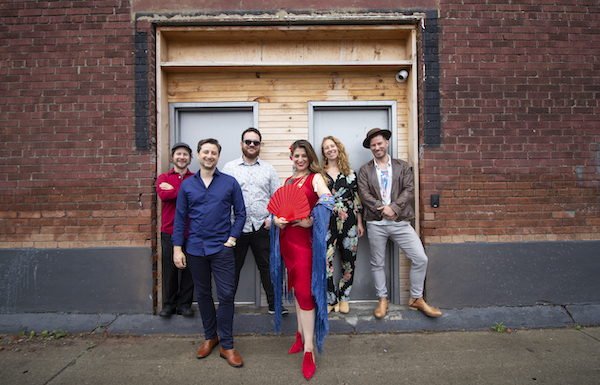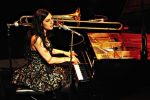Amsterdam’s Noam Vazana will play in Vancouver and Victoria next week. (photo by Robin Daniel Fromann)
Multifaceted Jerusalem-born, Amsterdam-based musician Noam Vazana comes to Canada this month for the first time. She plays in Calgary June 6, Vancouver June 7 and Victoria June 8.
Vazana’s B.C. dates are presented by Caravan World Rhythms, whose managing artistic director is Robert Benaroya, and she will perform with local guitarist and composer Itamar Erez, who also hails from Israel.
“I heard about Itamar through a joint musician friend, Yishai Afterman, and through the presenter of the show, Robert Benaroya,” Vazana told the Independent. “We got to know each other by phone and on Chat. Our first shows together will be in Vancouver and Victoria.”
Vazana’s music has myriad influences, including classical, pop, jazz and Sephardi. She composes, and has two CDs to her credit, Daily Sketch (2011) and Love Migration (2014). Performing regularly on stages around the world, she returns to the Netherlands after her shows in Canada, but has Poland, Morocco, Germany, France and Israel also on her tour schedule.
“This is an amazing year, performing 90 concerts in 12 countries,” she said. “I consider myself very lucky to combine my two greatest passions, music and traveling. I get inspired from new people and new places. I get excited every time before I go on tour – the night before, I can hardly sleep because I can already feel new experiences at my doorstep, waiting to accompany me or take me over or be a part of who I’m about to become. Bob Dylan said once that an artist is always in the state of becoming; somehow, it seems that in order to stay creative I always have to be on the way to somewhere.”
One of the unique aspects of her performance is that she plays the piano and trombone – at the same time.
“My first encounter with the trombone was in an explanatory concert the local orchestra gave at my school,” she said of her somewhat unusual choice of wind instrument. “They were demonstrating several instruments and, the moment I heard the trombone, I fell in love with its rich tenor sound. Another thing that appealed to me is that the trombone is an orchestral or combo instrument, so mostly you play it in a formation. When playing classical piano, especially the old-fashioned way, my teachers always told me it was forbidden to try when I asked to improvise and learn chords and songs. So, I mainly kept to the scores and played alone as a child. It sounded cool to me to play in an orchestra and get to play things that were out of the classical context I was already exposed to.”
The trombone stands she uses had to be invented, she said, “and designed especially for the purpose of playing trombone and piano simultaneously.”
“I first used a model I designed myself from a tripod used to support a window-shopping mannequin,” she explained. “It was working quite well but had one main flaw: it was centred right in front of me, in the middle of the keyboard, so I had to be very creative with the piano parts and manoeuvre around it when moving between the registers.
“Then I had a second prototype designed by an engineer who had good intentions but his strength lay in theory and not in mechanical skill. I was struggling to set up the stand during a soundcheck and the owner of the venue told me he knew a blacksmith who might be able to help me. That guy is amazing, autodidact with phenomenal skill, designing motorcycle engines from scratch. He mended the flaws of the second model and eventually created a much lighter third prototype, which is the stand I use today. I have two different models, one for pianos and the other for keyboard.”
Vazana also leads a Sephardi group called Nani, and she will be performing some songs from that repertoire on her tour. While the spark for Nani was kindled in Morocco, its source lies further back.
“At our house, Israeli culture was eminent,” said Vazana. “My father grew up in a kibbutz and I was brought up part traditional, part secular. Foreign languages were forbidden at home and, although my mother spoke fluent Moroccan Arabic and French, my father insisted she talk to me only in Hebrew.
“My grandmother on my mother’s side spoke Ladino and Moroccan Arabic and never assimilated in the Israeli culture, so some of my first memories include her speaking Ladino with my aunt and singing Ladino lullabies for me. She passed away when I was 12 – you can imagine that, throughout my childhood, she was very old and I didn’t get to spend a lot of time with her.
“In both 2012 and 2013, I was invited to play at the Tanjazz festival in Tangier and I took these opportunities to explore the cities where my families originated from, Casablanca and Fez. On my second visit to Morocco, in 2013, during one of my many walks down the narrow streets of Fez’s medina, I heard people singing on the street behind me. As I made way to them, there came more and more people, singing and playing drums and wind instruments, all to a familiar melody. The procession ended in a square and, as I arrived there – I was one of hundreds of people, young and old – I suddenly realized this is a melody that my grandmother used to sing for me in Ladino. It was a special moment and the rest of my travels in Morocco called memories of my grandmother back to me. I felt drawn to a root that was longing to be rediscovered.
“When I got back home,” she said, “I started researching more and more about the Ladino language and culture and started combining a song or two in Ladino in my regular shows. Slowly, I studied the language over the course of a year and developed a substantial repertoire. It resulted in recording a new Ladino album that will be released in September 2017, and winning the Sephardic music award … at the International Jewish Music Festival in Amsterdam,” which took place last month, May 4-8.
Vazana first visited Amsterdam on tour with an orchestra, as a classical trombone player, she said. “At the time, I was a student at the music academy in Jerusalem and this was intended as a 10-day work trip and another 10 days to explore the Netherlands, as it was my first visit. I checked some information about local musicians and schools and applied for lessons with musicians from the Concertgebouw Orchestra.
“After having a lesson with their bass trombonist,” she said, “he asked me if I’d be willing to come back for another lesson with his colleague, the principal trombone player. After a 45-minute lesson, they both decided to invite me to study with them at the Royal Conservatory of Amsterdam, with an internship at the Concertgebouw Orchestra. The day later, I found myself attending a rehearsal with the orchestra, absolutely mind-blowing, because it was the best orchestra I ever heard live (and the No. 1 in Europe at the time). It didn’t take a lot more to convince me to quit my studies in Jerusalem and transfer to Amsterdam.”
This move forms the creative foundation of Vazana’s second album, which won the ACUM (Israel Association of Composers, Authors and Publishers of Musical Works) album prize, charted No. 14 on the iTunes bestselling chart and No. 2 on DPRP’s (Dutch Progressive Rock Page’s) best albums of 2015. It was financed in part by crowdfunding, through which 800 advance copies were sold. (There is a video, set to her song “Waiting,” in which Vazana personally delivers the CD to various supporters, giving each of them a hug. It can be found at youtube.com/watch?v=tW5Y2IEjgI0.)
“Love Migration is a very personal and exposed album, combining parallel stories about two migrations: my first migration to follow my heart, which is music, while longing to find a feeling of home. The second migration is the long-distance relationship I had with an Israeli guy whom I met just as my EU visa was approved, eventually resulting in him migrating to live with me so I could continue to follow my dream,” explained Vazana. “The process took three years to evolve into stories one can retell [with] perspective…. It could have turned many ways, but my personal search eventually led me (and still is leading me) towards taking the feeling of home with me wherever I go. It has been a long journey, but life is a journey and I feel that I evolve every day anew. In my song ‘Lost and Found,’ I describe that sensation: “Every time I look in the mirror / Every time I stand in the corner / Every time I knock something over / It’s a way for starting over / It’s a way to see it anew.”
Vazana and Erez’s Vancouver concert is at Frankie’s Jazz Club June 7, 8 p.m., and their Victoria appearance is at Hermann’s Jazz Club June 8, 8 p.m. Tickets to both shows are $20 at the door and $15 in advance. Visit caravanbc.com or call 778-886-8908.




